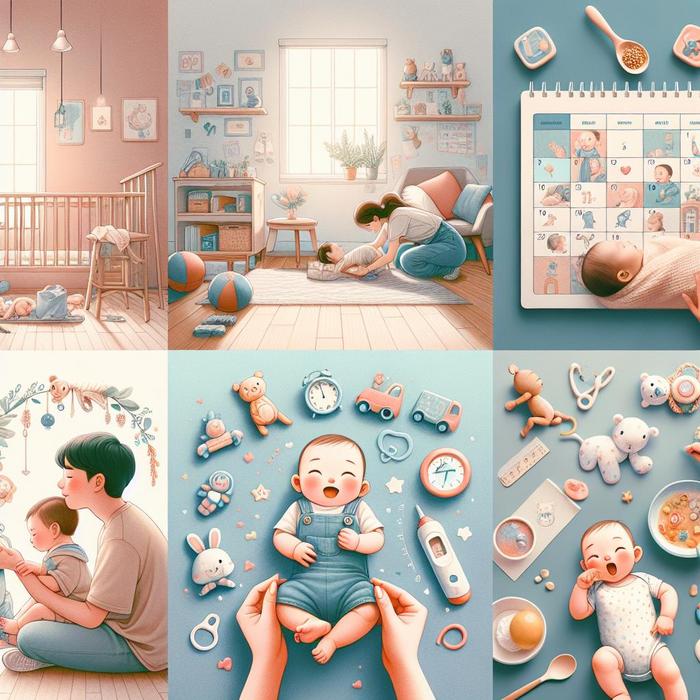The Stages of Your Baby’s Year One Development
As a parent, watching your tiny bundle of joy grow and change is an experience filled with wonder. Every coo, smile, and wave is a significant event in your baby’s year one development. If you’re unaware of what to look for, fear not! We’ve compiled a comprehensive guide on the phases of infant growth, focusing on the precious developmental milestones occurring in their first year.
Understanding Infant Growth and Development
Infant growth refers to the physical changes that babies undergo, such as gaining weight or growing in length. However, baby development focuses on their abilities to learn new skills, known as developmental milestones. While all babies grow at their own pace, these developmental markers provide a general idea of the changes you can expect during your baby’s first year.
Significant Milestones in Baby’s Year One Development
Not sure what developmental milestones to look out for in your baby’s first year? Here’s a general guide:
- The first three months: Babies start to smile, make cooing sounds, and hold up their heads. They also begin to follow objects with their eyes and respond to familiar voices.
- Four to six months: During this time, your baby might start rolling over, laughing, and even sit with support. They may also begin to reach for things and explore by putting objects in their mouth.
- Seven to nine months: Babies often start crawling, clapping, and understanding words like “no” or “bye-bye”. Some might even start standing while holding onto something.
- Ten to twelve months: In these months, babies may start to walk while holding onto furniture. They might even state few words! Plus, they will develop the dexterity to pick up small objects using their thumb and index finger.
Of course, every baby is unique, and the exact timing of these milestones may vary. For a more detailed, week-by-week development guide, check out here.
Factors That Influence Developmental Milestones
The pace of your baby’s development can be influenced by many factors, including genetics, environment, and stimulation. Providing a supportive, interactive environment is crucial for your baby’s healthy development. This means spending time together, talking, playing, and responding to their needs. You can find effective strategies for creating an engaging environment here.
Remember, it’s normal for babies to reach these developmental milestones at their own pace. But if you have any concerns about your baby’s development, don’t hesitate to consult your pediatrician or a child development specialist. They can provide personalized advice and reassurance based on your baby’s specific needs.
The Connection Between Sleep and Baby’s Development
It’s important to understand that sleep plays a crucial role in your baby’s development. During sleep, the brain can process new experiences, solidify memories, and prepare for the next day. Adequate sleep is, therefore, vital for your baby’s growth and their ability to meet developmental milestones. Strategies to improve your baby’s sleep patterns are detailed here.
As you witness your baby’s milestones, savor each special moment. After all, they are only little once, and every step they take is a testament to their growth and your love and support as a parent.
Helping Your Baby Meet Their Developmental Milestones
Beyond providing an engaging environment and adequate sleep, there are other ways you can support your baby’s development. These include:
- Regular health check-ups: Routine visits to the pediatrician ensure your baby is growing normally and meeting the appropriate development milestones. Find more information on these check-ups here.
- Proper nutrition: Offering your baby a balanced diet helps to support their overall growth and development, including their cognitive skills.
- Tummy time: This can boost your baby’s physical development, preparing them for sitting, crawling, and walking. Detailed explanation and tips on how to practice tummy time can be found here.
- Interaction & stimulation: Engaging with your baby through talking, reading, playing, and singing can boost their cognitive, social, and emotional development.
Baby’s first year is not only about physical growth and skill acquisition but also about building a healthy parent-child relationship. Bonding with your baby not only fosters their emotional development but also impacts their social interactions and overall happiness. More about this can be understood here.
What if Your Baby Misses a Developmental Milestone?
It is essential to remember that each baby is unique and develops at their own pace. There’s a wide range of “normal” when it comes to reaching developmental milestones. However, if you notice your baby isn’t meeting several milestones, it can be a good idea to discuss this with your pediatrician. Early intervention can support your child’s development and help address any potential concerns. Don’t panic, but do seek advice if you have worries.
Trust Your Parental Instincts
Even as a new parent, your instincts can guide you greatly. It’s important to trust your intuition when observing your baby’s development. Your knowledge of your infant – their behavior, reactions, and progress – is highly valuable in identifying if something may not be quite right. Remember, you are the best connoisseur of your baby!
Cherish Each Moment and Milestone
Amid all the guidelines and milestones chart, don’t lose sight of the joy that each moment of your baby’s growth brings. Celebrate each mini triumph, savor every giggle, and cherish each cooing sound – these form a rich tapestry of memories that you will hold dear for a lifetime. As your baby takes tiny yet significant steps in their development journey, you, too, are growing as a parent – patient, loving, and ever-adaptive.

